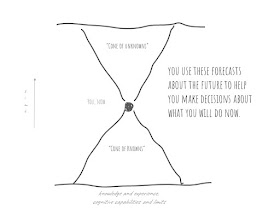Most people don't really understand that thinking about the future is a skill that can be learned--and can be improved upon with practice. More importantly, if you are making strategic decisions, decisions about things that are well outside your experience, or decisions under extreme uncertainty, being skilled at thinking about the future can significantly improve the quality of those decisions. Finally, being able to think effectively about the future allows you to better communicate your thoughts to others. You don't come across as someone who "is just guessing."
I wanted to make this case visually (mostly just to try something new). Randall Munroe (XKCD) and Jessica Hagy (Indexed) both do it much better of course, but a tip of the hat to them for inspiring the style below. It is a very long post, but it is a quick read; just keep scrolling!
As always, thanks for reading! I am very interested in your thoughts on this...)



























Thanks for posting! It directly reminds of Tetlock & Gardner's book "Superforecasting - The Art and Science of Prediction" and the forecasting challenges organized by IARPA. It is a helpful thought that (diligent) practice can enhance forecasting skills.
ReplyDeleteLast year the Netherlands (where I live) saw its first open-to-the-public forecasting tournament ( https://www.tno.nl/nl/over-tno/nieuws/2018/7/wil-je-ook-trainen-en-strijden-als-een-cyber-forecaster/ ). It was guided by Regine Joseph, who earlier was involved in IARPA's Good Judgment Project.
Thank you for sharing your thoughts! The cones of the (un)known remind me of a book on Henri Bergson by Gilles Deleuze. The term 'effectuation' (vs causation) was new to me and reminded me of the term 'elan vital' in the same book, https://www.goodreads.com/book/show/203326.Bergsonism
ReplyDeleteGood Morning! When will you be updating part four?
ReplyDeleteAsh (yes the same Ash)
Ash,
ReplyDeleteSoon...yeah, that sounds good...soon.
K